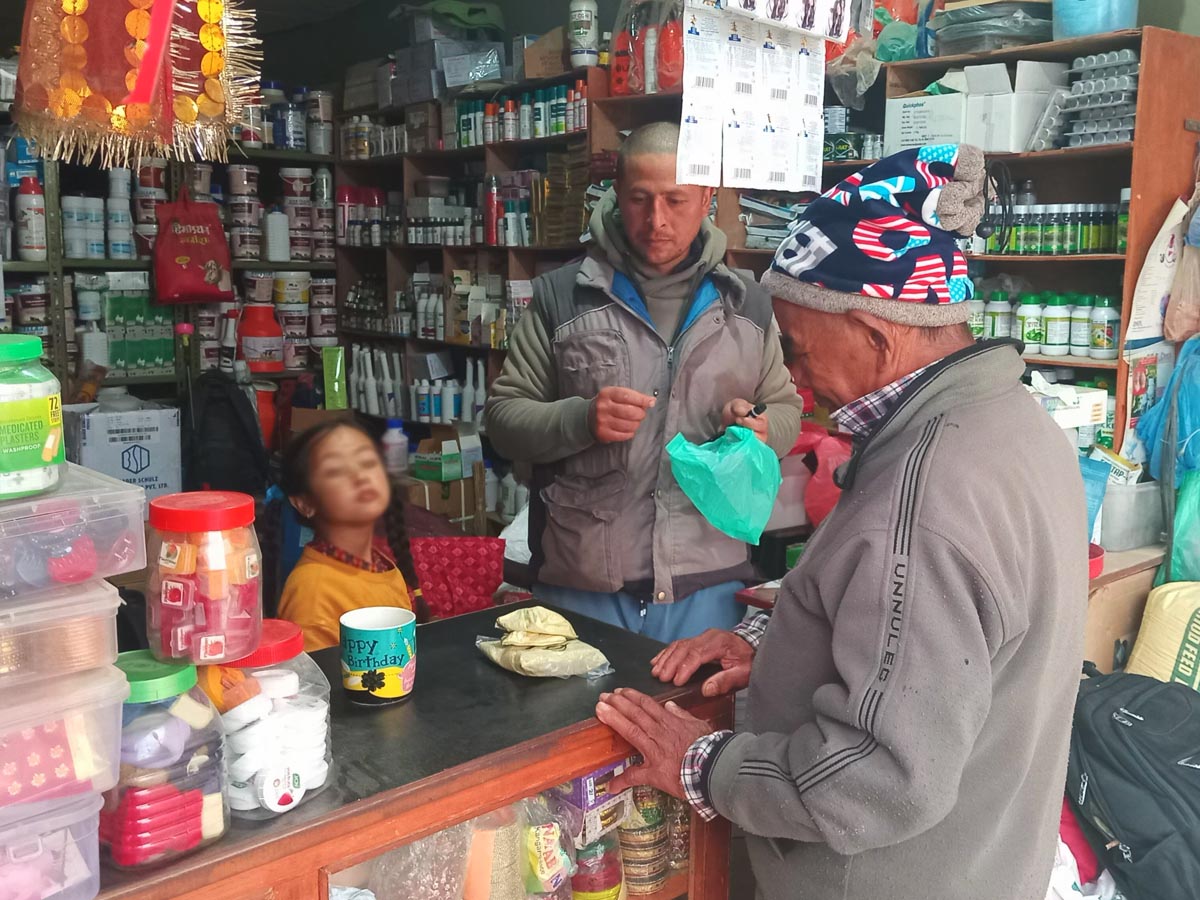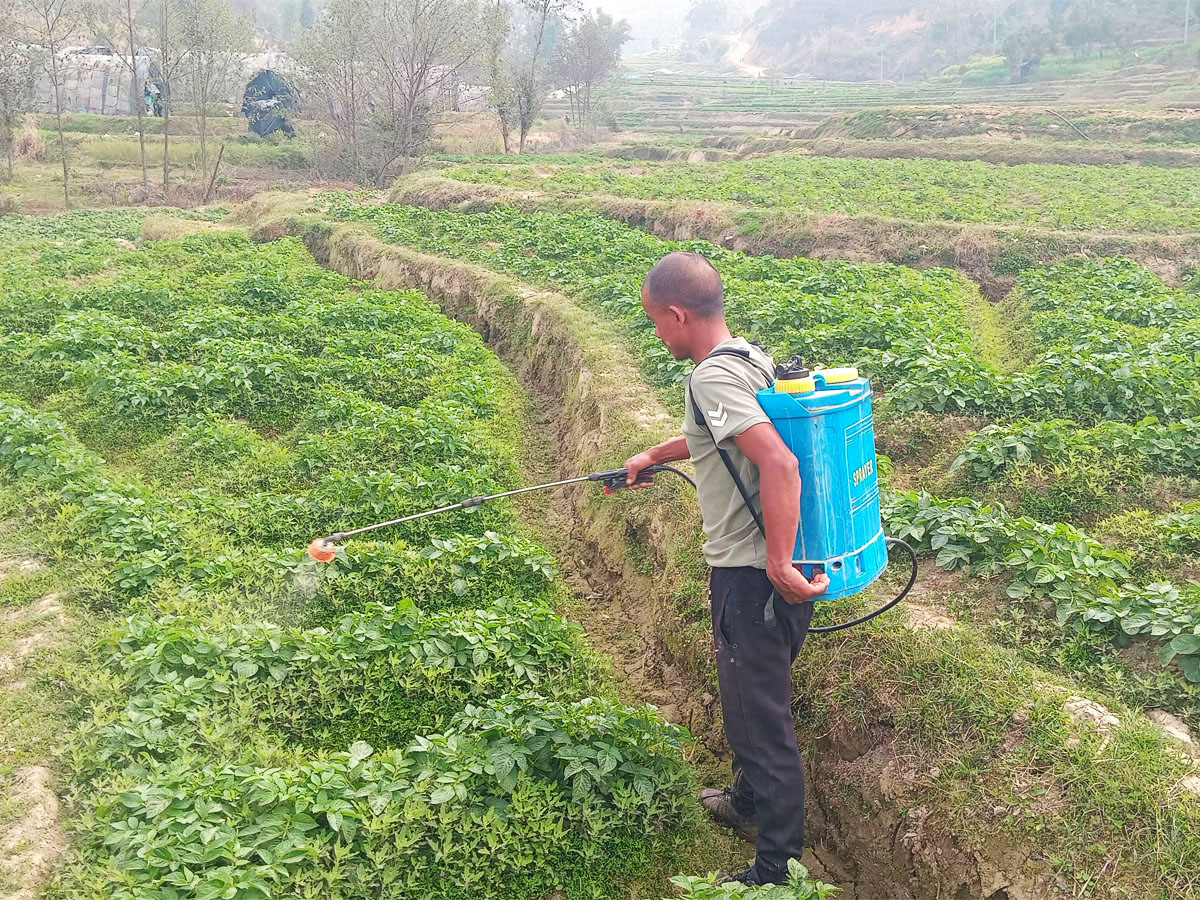Read this story in Nepali : आप्रवासीलाई मताधिकार : सरकारको तयारी नै कमजोर
The Supreme Court had ordered the government to formulate the necessary laws to ensure the right to vote from abroad for Nepalis living overseas. Following that order, local-level, provincial, and federal elections have already been held in the country. However, the Supreme Court's order has not yet been implemented. The government has not made significant progress in implementing the order ahead of the upcoming elections either.
--- ---
Shekhar Gautam from Gulmi Tamghas left Nepal eight years ago. At the time, preparations for the local level elections were underway. While he has been abroad, elections for the federal, provincial, and local levels have already been held twice.
 "Every time there's an election in the country, my heart aches," shared Shekhar, who contacted us via Messenger from Japan.
"Every time there's an election in the country, my heart aches," shared Shekhar, who contacted us via Messenger from Japan.
Like Shekhar, RC Paudel from Gorkha is also saddened by not being able to vote despite having the constitutional right to exercise suffrage. RC, who has been employed in the UAE for the past 10 years, says, "Due to the lack of practical implementation, I feel like my natural right to vote has been snatched away."
Sharing his experience that people working abroad have even more hope for social and political change than those living in the country, he says, "It feels bad to be left out of the constitutional process of change in some way."
According to the 2021 census, nearly 2.2 million Nepalis are abroad. Ramchandra Koirala from Kathmandu, who recently returned home after living in America for 10 years, says that even if overseas Nepalis want to vote, they cannot come to Nepal solely for that purpose due to the difficulty in managing both time and expenses.
Ramchandra, who says he gave up his US Green Card and returned to Nepal last year, states, "I have seen the pain of not being able to vote on the faces of many overseas Nepalis." Due to the mismatch of expenses and time, overseas Nepalis have a demand to be able to vote from abroad.
Understanding this sentiment of overseas Nepalis, Advocate Prem Chandra Rai, on behalf of the Law and Policy Forum for Social Justice, filed a writ petition in the Supreme Court against the Government of Nepal, demanding that Nepalis living abroad also have the right to vote.
Hearing the same writ, a joint bench of the then Supreme Court Justices Sapana Pradhan Malla and Purushottam Bhandari had issued a directive order on March 21, 2018 to ensure the right to vote from abroad for Nepalis living overseas.
The Supreme Court had ordered the government to formulate the necessary laws for this. Following that order, local-level, provincial, and federal elections have already been held in the country. However, the Supreme Court's order has not yet been implemented. The government has not made significant progress in implementing the order ahead of the upcoming elections either.
Singer Mina Niraula Pokharel, who has been in Canada for three years, is sad that she hasn't been able to participate in the process of choosing the country's leadership even after the Supreme Court's order. "The Supreme Court has ordered to give voting rights to Nepalis living abroad," she said in an online conversation from Canada, "if it had been implemented, our right to vote wouldn't have been taken away."
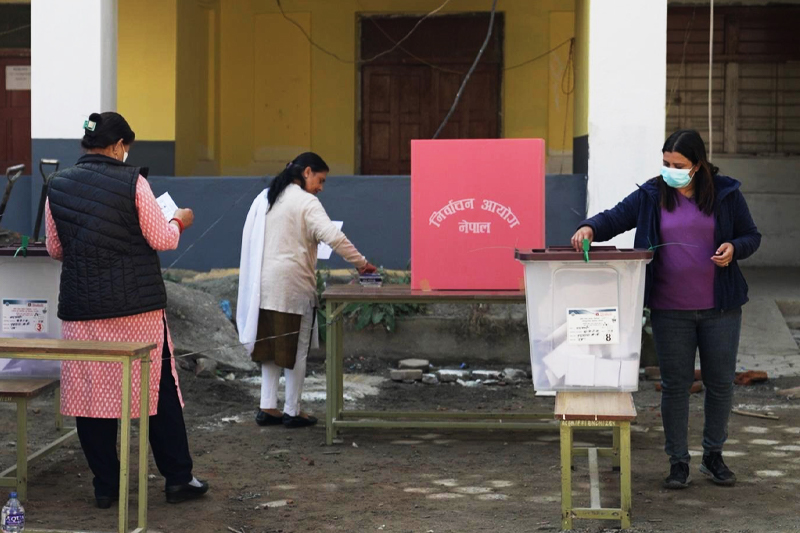
Former Chief Election Commissioner Bhojraj Pokharel says that he felt the need to give voting rights to Nepalis living abroad and formulated a policy after the 2008 Constituent Assembly election. Informing that the Election Commission's study at that time found some complexities, he says, "Just because there are complexities, the right to vote of Nepalis living abroad should not be denied. I had included that they should get it in the policy back in 2008."
Given the demands of overseas Nepalis, the Commission's policy, and the Supreme Court's order, political party leaders have also made numerous commitments regarding the voting rights of overseas Nepalis.
On March 20, 2022, the major political parties collectively expressed a verbal commitment, stating that they were in favor of enacting laws allowing Nepalis living abroad to exercise their right to vote.
In a program organized by the Nepal Policy Institute (NPI), leaders of the major parties unanimously stated their readiness to formulate necessary laws to ensure that Nepalis living abroad could vote in the upcoming 2027 elections.
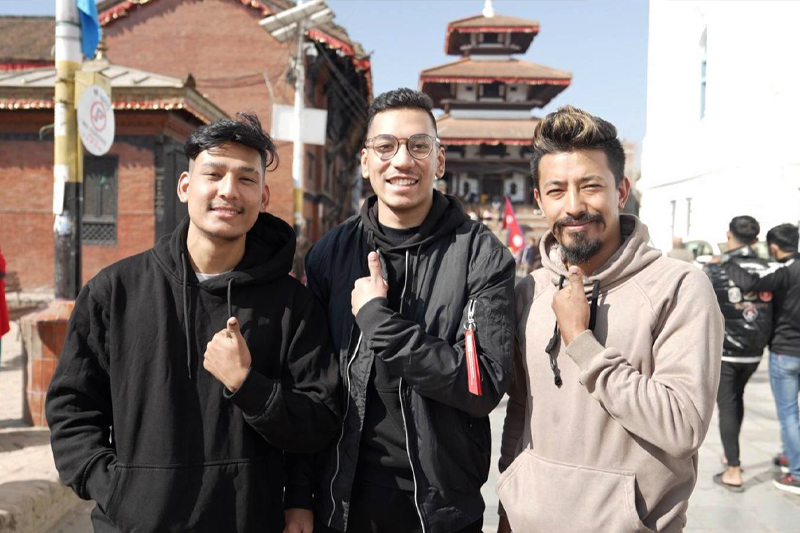
Among those who made such commitments were CPN (Maoist Center) leader and then-Energy Minister Pampha Bhusal, Nepali Congress spokesperson and former Foreign Minister Prakash Sharan Mahat, UML Deputy General Secretary and former Foreign Minister Pradeep Gyawali, and Janata Samajbadi Party Chairman and former Foreign Minister Upendra Yadav.
Following the Supreme Court's directive, the leaders not only made commitments, but the Election Commission also drafted a bill allowing Nepalis to vote from abroad and sent it to the Ministry of Home Affairs. On October 5, 2023, the Election Commission sent an integrated draft of the Election Act to the Ministry of Home Affairs, ensuring the voting rights of Nepalis residing overseas. It has been more than a year and a half since the draft was sent.
Meanwhile, Bharatmani Rijal, head of the Law Division at the Ministry of Home Affairs, says that the draft has been discussed multiple times. According to him, the draft has returned to the Home Ministry after further discussions at the Ministry of Law. Mentioning that the draft was prepared based on the old census data and has been sent to the Election Commission to revise some points according to the new census, Bharatmani says, "The discussion on the draft is in its final stage."
On December 29, 2021, the cabinet meeting had given in-principle agreement to the Election Commission to draft an integrated law related to elections. Following this, the Commission formed an eight-member Integrated Law Guidance Committee and an Integrated Election Law Drafting Committee, prepared the draft bill, and sent it to the Ministry of Home Affairs.
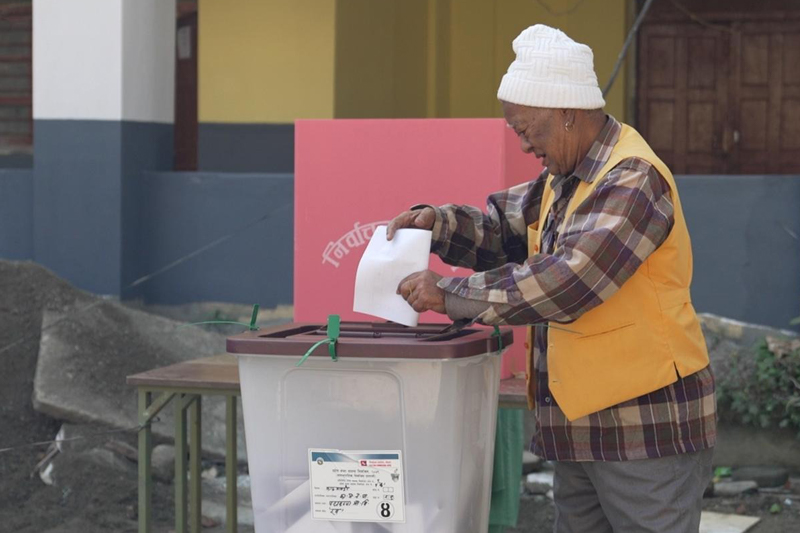
In the draft sent to the Home Ministry on October 5, 2023, there is a provision for Nepalis living abroad to vote from their respective countries. Chief Election Commissioner Dinesh Thapaliya states that the draft proposes that Nepalis living abroad will only be able to vote in the proportional representation system.
The draft of the integrated act mentions that the Commission will arrange for individuals whose names are included in the voter list abroad to vote in the proportional representation system election for the House of Representatives from the same country with the assistance of Nepali diplomatic missions.
Proposal for advance voting
Among the three main methods proposed by the Commission to involve overseas Nepalis in voting, one is advance voting.
According to this method, voters will receive ballot papers in advance at their current location. Voters will have to fill out the ballot papers and send them to the Election Commission within the specified time.
The US presidential election has a system of advance voting. Here, each state has its own rules, but in most states, voters can vote a few weeks before the election day. Advance voting can be done in person or by mail.
Advance voting is also very popular in Australia. There is a provision for advance voting by mail and by attending polling stations.
In Sweden, advance voting is allowed up to 18 days before the election.
Former Chief Election Commissioner Nilkantha Uprety says that countries like Finland and Germany have good practices of advance voting, which increases voter participation, reduces crowding, and provides opportunities for voters' convenience.
Polling centers at diplomatic missions
The commission has also made another proposal, which is to establish polling centers at Nepali embassies, consulates, or diplomatic missions abroad. The Commission has stated in the draft that overseas Nepalis will be able to vote by going to their nearest diplomatic mission on the specified date.
Nepal has already practiced giving voting rights to some Nepalis living abroad by establishing polling centers at diplomatic missions abroad, during the 1980referendum.
According to the book ‘Election History’ published by the Election Commission, polling centers were set up at Nepali embassies, consulates, and the Permanent Mission of Nepal to the United Nations in the respective countries for overseas voters at that time. Government employees, employees of government or organized institutions, and their family members were allowed to vote there.
There was a provision for the Commission to designate employees of Nepali diplomatic missions as authorized to collect voter names in the form prescribed by the Commission and to conduct voting, and the voter list prepared by them would be final.
Since only those whose names were on the voter list were allowed to vote, individuals wishing to include their names on the voter list had to bring their passports for registration, and those without passports had to obtain an identity card from the Nepali diplomatic mission.
Online voting another option
The Commission has proposed, as the third option, a system where voters can cast their votes online using modern technology.
Former Chief Election Commissioner Nilkantha Uprety says that among the proposed methods, online voting is the best option. According to him, countries like America, Canada and Switzerland are practicing online voting.
He states that online voting is the best option for granting voting rights to overseas Nepalis. According to him, challenges such as hacking risks, voter authentication, and software attacks can arise in online voting.
In 2019, security vulnerabilities were found in Estonia's online voting system, which raised questions about the system's security.
"Technical and legal infrastructure is necessary to ensure the reliability of online voting," Nilkantha says. "Although online voting has been successfully implemented in some countries, it is necessary to address the security and reliability challenges associated with it."
Chief Election Commissioner Dinesh Thapaliya also acknowledges that there are more challenges than possibilities in involving citizens living abroad in voting.
Although the Commission has proposed three methods to involve overseas Nepalis in voting, the formal decision on this will have to be made by the Government of Nepal.
Parties are positive
All parties are positive about granting voting rights to overseas Nepalis. On June 21, 2022, Nepali Congress General Secretaries Gagan Kumar Thapa and Bishwa Prakash Sharma themselves went to the Election Commission and said, 'It is not enough to make the notes of Nepalis outside Nepal valid; a day must come when their votes are also valid.'
Congress General Secretary Bishwa Prakash says that they made this demand while the Election Commission was preparing the draft. However, he acknowledges that there are challenges in involving overseas Nepalis in the elections. He says, "Challenges are certainly there, but the government should enact laws without viewing the technical difficulties as insurmountable challenges."
Congress General Secretary Bishwa Prakash claims that if the government prioritizes initiating law-making, overseas Nepalis will get the right to vote in the 2027elections themselves.
"I have always said, there is one Nepal spread from Mechi to Mahakali, which has both geography and emotion, and another Nepal outside Mechi-Mahakali, which has emotion but no geography," Bishwa Prakash adds. "If the government has the will, overseas Nepalis can be included in the proportional representation system in the elections to be held in 2027."
However, he says that more homework needs to be done and it will take time to arrange for overseas Nepalis to also vote for directly elected candidates.
RC Paudel, who is in the UAE, also argues that if the government wants, Nepalis living abroad can exercise their right to vote. "If the government wishes, it is absolutely possible for us to vote through the embassies of all the countries with which we have established diplomatic relations," he says. "But the current state neither wants to solve its technical and diplomatic complexities nor does it want Nepali citizens to be able to vote from the countries where they reside."
The CPN-UML, which is leading the government, has claimed that the government's view on involving overseas Nepalis in voting is also its official view. "The government is working correctly, and our party is in the government," says Pradeep Gyawali, UML Deputy General Secretary and former Foreign Minister. "The government's view is the official view of our party."
When the Election Commission sent the draft to the Ministry of Home Affairs, Narayan Kaji Shrestha was the line minister. He said that the draft was discussed 12 times while he was in the ministry. "We held in-house discussions, we discussed with the Election Commission," says Narayan Kaji. "That draft was almost in its final stage."
Former Home Minister Narayan Kaji, who claims to have made efforts as the line minister to involve overseas Nepalis in voting from their respective countries, says that this task is complex. He says, "In more than a dozen discussions held at the ministry, the discussion was about how complex it is to involve them in voting from the countries where they reside."
However, Narayan Kaji states that the Maoist party's initiative is to ensure the voting rights of overseas Nepalis. "When I was in the ministry, we had an agreement that Nepalis living abroad could also vote if they came a few days before the election," he says. "But an agreement was yet to be reached on the possibilities and complexities of conducting voting from the countries where they reside."
Shishir Khanal, a Member of Parliament from the Rastriya Swatantra Party (RSP), says that they are urging the Election Commission regarding granting voting rights to overseas Nepalis. "We are the opposition party; we do not have the authority," he says. "Our role is to put pressure for the enactment of laws, and we are doing that."
Rajendra Lingden, Chairman of the Rastriya Prajatantra Party (RPP), argues that if the government wants, overseas Nepalis can be involved in the upcoming elections. Recalling that some Nepalis voted from abroad even during the 1980 referendum, he says, "At that time, arrangements were made for government employees abroad to vote through Nepali embassies or diplomatic missions. Even then, voting rights were not granted widely to the overseas Nepali community."
He says that such a practice has not been repeated in Nepal since then. RPP Chairman Rajendra Lingden states that his party is saddened that the Supreme Court's order to grant voting rights to overseas Nepalis has not been implemented due to legal and technical structures.
Depends on government’s honesty
Given that party leaders are in favor of granting voting rights and the Supreme Court has already issued an order, overseas Nepalis accuse the government of not being honest in granting them this right.
Shekhar, who is in Japan, sounds angry with the government, saying that the remittances they send after toiling abroad are valid, but their votes are not. He says, "It doesn't seem like the state has given us proper respect; it is unfortunate that overseas Nepalis are limited to just remittances."
Former Chief Election Commissioner Nilkantha Uprety, recalling that the constitution has ensured the right to vote for every adult citizen and that the Supreme Court has also ordered to make arrangements for Nepali citizens living abroad to vote, says that the responsibility of arranging voting for Nepali citizens living abroad lies on the shoulders of the government.
He claims that even though the Supreme Court has ordered to grant voting rights to Nepalis living abroad, it has not been implemented because Nepal lacks experience on how to exercise this right.
In its six-point mandamus, the Supreme Court has said to consider the records prepared by the diplomatic missions abroad as official to ensure the voting rights of Nepalis who have gone abroad, to use various voting technologies, and to conduct 'pilot tests' if necessary.
However, even the government does not have accurate information on how many countries Nepalis have reached around the world so far, says Nilkantha. "Some say Nepalis are in 112 countries, some in 114, and some in 115," he says. "It doesn't seem likely that a government that cannot even keep such basic statistics can accurately determine who is a genuine voter and who is not."
According to the Department of Foreign Employment, Nepalis have reached 110 countries through institutional labor permits and 172 countries through individual labor permits. According to the Department, the government has opened 111 countries for work through institutional labor permits.
Former Chief Election Commissioner Nilkantha says that even though the court's order sought to provide justice to all citizens, the lack of significant interest from the government has meant that the voting rights of overseas Nepalis have remained just a topic of discussion.
He says that despite the possibilities, everything depends on the government's preparation and honesty. Nilkantha says, "One must be prepared to take risks and make financial investments."
He argues that it is not impossible to conduct voting using 'technology' that allows one to fly, drive, laugh, speak, and write, but the government is afraid to do so. "Today's Election Commission, political parties, and today's parliamentarians must have the courage and will to involve Nepalis living abroad in voting from their respective countries," Nilkantha adds. "It's not that there are no challenges behind this, but one must be prepared to face them."
Another former Chief Election Commissioner Bhojraj Pokharel says that if the government and parties want, overseas Nepalis can be involved in proportional representation voting in 2027 itself. He emphasizes that to fully involve them in voting, one must go for 'internet voting'.
"Nepali diaspora can be involved in proportional representation voting"
- Bhojraj Pokharel, Former Chief Election Commissioner
Is it possible to involve overseas Nepalis in elections from abroad?
Speaking in the context of Nepal, a referendum was announced in 1979 and held in May 1980. At that time, it was said that people working in diplomatic missions abroad and government employees abroad would be given the right to vote. It was then that some Nepalis exercised their right to vote from abroad for the first time. This practice has not been repeated since.
Why hasn't it been possible?
After the political change of 1990, there were occasional faint voices raised but not in the prominent way as it is happening now. There is a reason why the voice is being raised so strongly now. A large portion of the voters who participate in the elections are outside the country. Their votes can determine who wins and who loses. Both those who want to take those votes and those who want to give them have a desire for this. That's why the issue of voting rights for overseas Nepalis is being discussed.
In the current context, the Supreme Court has also issued an order, and the Election Commission has also provided a draft. Party leaders keep saying that they will make arrangements by 2027. Efforts might be underway from the government's side.
Was this issue raised during your tenure as well?
This issue was raised during the 2008 Constituent Assembly election. There was a phase of discussion as well. However, at that time, collecting the voter list within the country for the election was a huge task. We were initially given six months, and then another six months were added. If we had been given a year-and-a-half from the beginning, it would have been possible to plan accordingly. Therefore, at that time, the matter was raised that it was not possible due to technical complexities.
Our leaders go to programs organized by non-resident Nepalis abroad. They seem to come back promising to grant voting rights. Leaders who go to NRN-sponsored programs speak what sounds pleasing to the ear. This issue was raised in the parliament at that time. There were discussions about its complexities. Laws were also made. However, the issue of arranging voting for Nepalis living abroad was not included there. Then, one or two mid-level leaders came back and questioned us, saying, "We went there and said we would arrange voting for you, why hasn't it been arranged here?" The matter was not included in the law because it was deemed impossible when the laws were being made.
In some cases, without considering whether it can be done or not, speaking what someone wants to hear has reduced our credibility. After the 2008 election, we also realized this. Then, the Commission prepared a five-year strategy for the first time, aiming to improve the electoral constituencies. At that time, we formulated a policy to arrange voting rights for Nepalis living abroad as well. Studies were conducted at various phases. We went to various places to find out whether it was possible or not.
Only then did the Election Commission submit a proposal, believing it was now possible. That proposal is still under consideration with the Government of Nepal. We do not know when it will be implemented. It is entirely a matter that depends on political leadership.
The Supreme Court has ordered to grant voting rights to overseas Nepalis. The Election Commission has also submitted a draft of the law to the Ministry of Home Affairs. Party leaders are also publicly saying that overseas Nepalis should be given the right to vote. But they are not getting the right to vote. Whyis there a delay in this?
To understand why there is a delay, let's discuss some of its technical complexities.
We currently have a mixed electoral system. When we think about giving everyone the right to a full election, not a fragmented one, the first complexity to consider is managing the scattered Nepali voters everywhere so that no one is left out of the voter list.
Determining which country, which corner, which restaurant, or which office someone works in to include them is a complexity.
The second aspect is that we always only talk about the voting rights of people who carry passports, can speak a bit, earn relatively well, and are from far-off places. There is also a large number of Nepalis outside the country who do not carry passports. Should those without passports be given the right to vote or not? If so, how to include them? When granting rights, should it be given to everyone or only to those who can speak up? How to provide justice to everyone is a fundamental question.
Third, let's say we manage all these things and decide to allow voting. Where will the voting take place? For example, let's talk about Qatar right now. There might be people from more than 160 constituencies out of the 165 constituencies in Nepal working in Qatar. If there are voters from more than 160 constituencies there, our embassy can be a polling center. We would have to conduct voting for 160 constituencies there. How easy would it be to bring voters from all over Qatar and arrange for them to vote on one day within the stipulated time? There are technical complexities.
Now, looking at it politically, it is possible that some parties have calculated how many voters living abroad belong to them and how many belong to others.
This issue has also been included in the election manifestos of some parties. Leaders also easily express commitments to grant voting rights when they go to public programs. Are they unaware of these technical complexities?
I don't know. You should ask them. In 2008, they went abroad and said they would grant voting rights. Here, a delegation came and argued, "We came saying we would give it there, why haven't you given it here?" I am not talking about all leaders, just the limited individuals who came to me.
We have fallen behind because we are losing our credibility. What the leadership says is what should be done. A leader should be able to say what cannot be done and why it is not possible. That's called a leader, not the one who just says what the crowd wants to hear. Because we are caught in the cycle of such leaders, our voter brothers and sisters living abroad are also stuck in the same predicament.
Aren't there any alternatives to this?
There are alternatives. We need to take the easy route. Full voting rights, and by full I mean both direct and proportional representation, I still don't see it being possible for many years in a fair manner. No matter what they say, if the intention is just to give it to a few limited people working in embassies and to the vocal leaders, not in a just way, then that's a different matter. It's not possible in a fair manner until we fully transition to internet voting.
Right now, we don't even trust the internet with our bank money. So, how many years will it take for our leadership to trust the internet enough to believe that clean voting will occur? Therefore, without ‘internet voting’, full and fair voting is not possible. I have no qualms in saying that.
However, there is a possibility for proportional representation voting. Right now, there is only one ballot paper for proportional representation. The same ballot paper reaches everywhere. If the government wants, this is possible. But the government has to want it. The Election Commission has already wanted it. It prepared and sent the draft. Now the government has to want it.
To provide justice when conducting symbolic voting by placing polling centers in important places, another thing that needs to be done is 'multiple-day voting.' It's called 'advance voting' or 'earlier voting.'
I will share my experience from Sudan. Due to its nature and geography, voters had to come from very far away, so there was a system where people could come and vote for seven consecutive days, starting seven days before the actual election day.
The second alternative is to limit it to proportional representation and to negotiate with the governments of those countries where many Nepalis reside on how to establish polling centers in as many places as possible. If we do that, we can grant the right to vote in the proportional representation system.
We are talking about online voting. You yourself mentioned that we cannot even trust internet banking. Surely, it must have its own complexities and challenges ?
The world of technology is incredibly vast. The most successful nation in online voting is Estonia. A large portion of their votes comes through the internet. I myself had been to their elections. Their head of state was very technology-friendly.
Regarding the question of what things to consider when going into technology, the first thing is trust in the technology itself. Even now, many countries in America, Europe, and the UK have not been able to implement online voting. There are concerns that technology could be 'manipulated' and 'election manipulated.'
I have also participated in many elections in Africa. The major electoral violence there has also been 'tied up' with technology. By 'manipulating' the technology, the 'result' was 'manipulated.' In Kenya's 2017 election, thousands of people lost their lives.
The second thing is that purchasing the technology, maintaining it, updating it, and securing it requires a significant investment. Is our country ready for that?
Let's talk about the third thing. Even now, our Prime Minister's Office website gets hacked. Some services have been shut down at our airport. Passports have been shut down. We are facing such problems due to the inability to secure technology. In that situation, we are talking about technology voting.
There are powerful ‘interest groups’ here who wish for so-and-so to win or lose the election. They have greater power and capacity than we do in how to ‘manipulate’ that technology. If these forces decide to use technology to ‘manipulate’ the election, what will happen? Therefore, the biggest issue is how we can secure the technology.
I have been observing the US elections since 2008. America, which moved to ‘electronic voting’ in 2008, has now returned to ‘paper ballot’. We need to study these reasons deeply.
Furthermore, in rural areas, one person goes and votes using another person's ID card. In technology, what if one person obtains many people's ‘passwords’ and votes?
Issues of ‘credibility’ and trustworthiness are intertwined with this. The biggest issue is money. It's easy to say ‘technology’. But how much can we invest? We need to consider and understand all these things before proceeding.
I am not seeing it as easy as it is being said right now. Because I have seen and observed many elections around the world. I am still observing. It's not as light a matter as we have taken it to be.
That said, just because there are complexities, the voting rights of Nepalis living abroad should not be denied. I had included in the policy back in 2007that they should get it.
What can Nepal learn from the practices of other countries? Are there any models that can guide us?
There are various models. For ‘internet voting’, I mentioned Estonia. That is the appropriate practice right now. International experience is extremely important for us.
We can conduct proportional representation voting. It might not be full justice all at once, but we can provide partial justice. If we pay attention to that, we won't have to wait long. Many countries have ‘earlier voting’ practices.
I have been advocating for this for many years. Now the timing is right. We must determine the election date well in advance and include it in the law that the election will be held on this day. If that can happen, people who will be abroad can adjust their schedules five years in advance. Another thing we need to have is ‘multiple-day voting’ and ‘advance voting’. This would allow people to come and vote at their convenience without having to wait for the exact election day. Despite all these things, the ultimate solution is ‘internet voting’.
Please adhere to our republishing policy if you'd like to republish this story. You can find the guidelines here.


